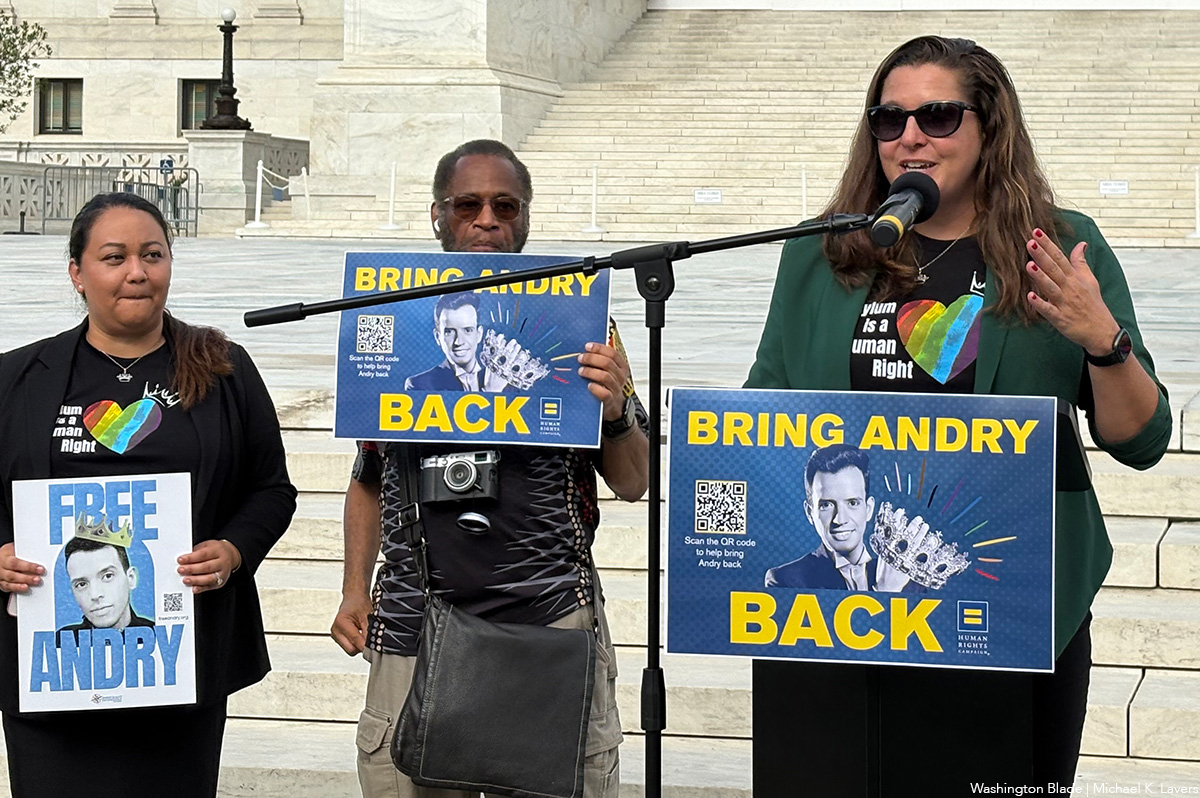National
Opponents of FOSTA law win Appeals Court victory
Ruling sends case back to District Court for decision on merits


U.S. Court of Appeals for the D.C. Circuit. (Photo public domain)
In a little-noticed action, the U.S. Court of Appeals for the D.C. Circuit on Jan. 24 overturned a lower court ruling dismissing a lawsuit challenging the constitutionality of a controversial federal law that holds websites criminally liable if found to “promote” or “facilitate” prostitution between consenting adults.
The lawsuit charges that the law passed by Congress called the Allow States and Victims to Fight Online Sex Trafficking Act of 2017 known as FOSTA violates the First and Fifth Amendments of the U.S. Constitution by criminalizing protected speech and expression and holding someone liable for an action committed before the FOSTA law made it illegal.
LGBTQ rights organizations have joined civil liberties and sex worker rights groups in asserting that FOSTA has failed to bring about its intended purpose of curtailing human sex trafficking of adults and minors. Instead, critics say it has resulted, among other things, in internet sites refusing to accept ads from sex workers seeking consenting adults as customers, forcing sex workers to return to the streets where they are subjected to danger.
The lawsuit was filed in 2018 by the D.C.-based Woodhull Freedom Foundation, which advocates for decriminalization of sex work; the New York-based Human Rights Watch; and a massage therapist named Eric Koszyk, who says his massage business was wiped out when the FOSTA law prompted Craigslist to bar him from advertising on the site.
Others that joined the lawsuit as plaintiffs are the San Francisco-based Internet Archives, which serves as a digital “library” of websites that could be charged under FOSTA with promoting prostitution; and a sex worker advocate identified as Jesse Maley.
At the request of the U.S. Justice Department, which defended FOSTA against the lawsuit, U.S. District Court Judge Richard J. Leon dismissed the lawsuit on grounds that none of the plaintiffs had legal standing to file the suit. Leon upheld the Justice Department’s argument that the organizations and individuals filing the lawsuit were not in actual jeopardy of being prosecuted under FOSTA.
In his ruling dismissing the case, Leon did not make a determination of whether or not FOSTA is unconstitutional, only that the plaintiffs didn’t have legal standing to bring the issue before the court.
In its Jan. 24 decision to overturn Leon’s ruling, a three-judge panel of the D.C.-based U.S. Court of Appeals for the District of Columbia Circuit held that at least two of the plaintiffs did have standing to challenge FOSTA. The judges said the two plaintiffs showed that they could possibly be subjected to criminal prosecution or harmful civil litigation made possible by FOSTA because of their efforts advocating for sex workers.
The decision by Appeals Court Judges Judith W. Rogers, Thomas B. Griffith, and Gregory G. Katsas sends the case back to the District Court, where Judge Leon will be required to decide the case on the merits.
Robert Corn-Revere, the lead attorney representing the plaintiffs in the case, told the Blade that under this type of case, Judge Leon will issue a decision himself without a trial by a jury because the case is based on the interpretation of the FOSTA law’s constitutionality.
“It’s not like a case where you’re trying to decide who caused an accident, when the jury has to listen to testimony of the facts on both sides and decide factually what happened,” Corn-Revere said. “Where you have a case like this where the dispute is over what the law means, the judge should be able to issue a ruling based on whether or not the law is consistent with the Constitution.”
In a statement released at the time the lawsuit was filed in July 2018, Ricci Levy, the Woodhull Freedom Foundation’s president and CEO, said her organization strongly supports “appropriately targeted and effective measures to end sex trafficking.”
Added Levy, “FOSTA, however, erroneously conflates consensual sex work with trafficking, and will interfere with more productive attempts to protect vulnerable people from harm. FOSTA also chills online expression about sexual topics and encourages massive self-censorship by internet platforms.”
National
FDA approves new twice-yearly HIV prevention drug
Experts say success could inhibit development of HIV vaccine

The U.S. Food and Drug Administration (FDA) on June 18 approved a newly developed HIV/AIDS prevention drug that only needs to be taken by injection once every six months.
The new drug, lenacapavir, which is being sold under the brand name of Yeztugo by the pharmaceutical company Gilead Sciences that developed it, is being hailed by some AIDS activists as a major advancement in the years-long effort to end the HIV/AIDS epidemic in the U.S. and worldwide.
Although HIV prevention drugs, known as pre-exposure prophylaxis medication or PrEP, have been available since 2012, they initially required taking one or more daily pills. More recently, another injectable PrEP drug was developed that required being administered once every two months.
Experts familiar with the PrEP programs noted that while earlier drugs were highly effective in preventing HIV infection – most were 99 percent effective – they could not be effective if those at risk for HIV who were on the drugs did not adhere to taking their daily pills or injections every two months. Experts also point out that large numbers of people at risk for HIV, especially members of minority communities, are not on PrEP and efforts to reach out to them should be expanded.
“Today marks a monumental advance in HIV prevention,” said Carl Schmid, executive director of the D.C.-based HIV + Hepatitis Policy Institute, in a statement released on the day the FDA announced its approval of lenacapavir.
“Congratulations to the many researchers who spent 19 years to get to today’s approval, backed up by the long-term investment needed to get the drug to market,” he said.
Schmid added, “Long-acting PrEP is now not only effective for up to six months but also improves adherence and will reduce HIV infections – if people are aware of it and payers, including private insurers, cover it without cost-sharing as a preventive service.”
Schmid and others monitoring the nation’s HIV/AIDS programs have warned that proposed large scale cuts in the budget for the U.S. Centers for Disease Control and Prevention by the administration of President Donald Trump could seriously harm HIV prevention programs, including PrEP-related efforts.
“Dismantling these programs means that there will be a weakened public health infrastructure and much less HIV testing, which is needed before a person can take PrEP,” Schmid said in his statement.
“Private insurers and employers must also immediately cover Yeztugo as a required preventive service, which means that PrEP users should not face any cost-sharing or utilization management barriers,” he said.
In response to a request by the Washington Blade for comment, a spokesperson for Gilead Sciences released a statement saying the annual list price per person using Yeztugo in the U.S. is $28,218. But the statement says the company is working to ensure that its HIV prevention medication is accessible to all who need it through broad coverage from health insurance companies and some of its own support programs.
“We’ve seen high insurance coverage for existing prevention options – for example, the vast majority of consumers have a $0 co-pay for Descovy for PrEP in the U.S. – and we are working to ensure broad coverage for lenacapavir [Yeztugo],” the statement says. It was referring to the earlier HIV prevention medication developed by Gilead Sciences, Descovy.
“Eligible insured people will get help with their copay,” the statement continues. “Gilead’s Advancing Access Copay Savings Program may reduce out-of-pocket costs to as little as zero dollars,” it says. “Then for people without insurance, lenacapavir may be available free of charge for those who are eligible, through Gilead’s Advancing Access Patient Assistance Program.”
Gilead Sciences has announced that in the two final trial tests for Yeztugo, which it describes as “the most intentionally inclusive HIV prevention clinical trial programs ever designed,” 99.9 percent of participants who received Yeztugo remained negative. Time magazine reports that among those who remained HIV negative at a rate of 100 percent were men who have sex with men.
Time also reports that some HIV/AIDS researchers believe the success of the HIV prevention drugs like Gilead’s Yeztugo could complicate the so-far unsuccessful efforts to develop an effective HIV vaccine.
To be able to test a potential vaccine two groups of test subjects must be used, one that receives the test vaccine and the other that receives a placebo with no drug in it.
With highly effective HIV prevention drugs now available, it could be ethically difficult to ask a test group to take a placebo and continue to be at risk for HIV, according to some researchers.
“This might take a bit of the wind out of the sails of vaccine research, because there is something so effective in preventing HIV infection,” Time quoted Dr. David Ho, a professor of microbiology, immunology, and medicine at New York’s Columbia University as saying.
District of Columbia
Creators on the Frontlines: Inside D.C.’s influencer conference
The conference empowers creators to drive political awareness and action, particularly among young voters whose turnout in recent elections has been alarmingly low

The Trending Up Conference brought together influential digital voices, lawmakers, advocacy organizations and movement leaders to discuss how creators are redefining the political landscape. Last month, over 200 content creators gathered in the nation’s capital, not to chase likes or algorithmic trends, but to take meaningful action in shaping policy.
Through collaborative sessions on topics ranging from the economy and climate change to LGBTQ rights, immigration, reproductive rights, education and disability justice, the conference showcased the powerful role creators play in shaping public discourse. It also provided dedicated spaces for creators and policymakers to work side by side, building connections and strategizing for impactful change.
“The more we collaborate and work together, the more successful we will be in advocating for human rights for everyone,” said Barrett Pall, a life coach and influencer in the queer community.
Rep. Maxwell Frost (FL) the youngest member of Congress, discussed innovative strategies for civic engagement. He emphasized the importance of meeting young voters where they are — through culture, music, and storytelling — to combat political disengagement. Frost, a former organizer and musician himself, has long championed the use of creative platforms to mobilize underrepresented communities and inspire a new generation to participate in the democratic process.
His remarks aligned with a central goal of the conference: to empower creators to drive political awareness and action, particularly among young voters whose turnout in recent elections has been alarmingly low.
Warren emphasized the importance of creators in driving meaningful change.
“You are the people making America’s national conversation. What we’re trying to do here matters, and you’re part of that fight,” urged Sen. Warren, adding that they should recognize their power and responsibility. “If enough of us tell enough stories, we’ve got a real chance to build a country where every kid has a fighting chance.”
She continued by reinforcing the value of our voices.
“This moment is up to you to make the decision,” she said. Warren then asked the audience, “what are you going to do when your country is in real trouble?” Warren’s message was clear: creators are essential in this moment and our voices must be uplifted and leveraged in the fight to reshape the nation for the better.
“We need to find ways to talk to each other across this nation and that conversation starts with all of you,” she said.
Former Transportation Secretary Pete Buttigieg also emphasized the importance of reaching audiences across all platforms.
“Whether it’s going on Fox or going on Flagrant, how can I blame somebody for not embracing the message that I believe in if they haven’t heard it? We’ve gotta be cross-cutting these platforms [or else] no one is persuading anybody,” said Buttigieg.
He believes in meeting people where they are, spreading progressive messaging in language that resonates, and ensuring that those who might not typically hear his message have access to it.
“Democrats used to think that they were the ones who were digitally savvy,” he added. “The algorithm is not neutral.” A recent study revealed that TikTok’s algorithm during the 2024 presidential race disproportionately recommended conservative content — Republican posts received 11.8% more recommendations than Democratic content. This highlights how platforms themselves can skew the political narrative, further underscoring the necessity for creators to actively push back against these digital biases.
“What we build next has to be different from what we inherited,” Buttigieg said. “You are at the very heart of that — that’s why I’m here today.”
While Buttigieg advocates for engaging across platforms, California Governor Gavin Newsom’s approach has raised concerns. Instead of using his platform to meet a broad spectrum of voters, Newsom has recently chosen to amplify far-right voices. His decision to invite extremist figures like Charlie Kirk and Steve Bannon onto his podcast under the guise of creating a “middle ground” is deeply troubling. At the same time, Newsom — who once championed California as a sanctuary for transgender youth and a defender of inclusive education—has taken a stance against transgender women and girls competing in female sports, calling it “deeply unfair.”
“I think it’s an issue of fairness. I completely agree with you on that. It is an issue of fairness, it’s deeply unfair. We’ve got to own that. We’ve got to acknowledge it,” he told Kirk. This capitulation to conservative talking points doesn’t just undermine his past work—it emboldens those who are trying to dismantle hard-won rights.
At Trending Up, creators pushed back against this political drift by meeting directly with California representatives to discuss urgent social issues — including threats to Medicaid, the pink tax, disability rights and the disproportionate impact of billionaire tax breaks. Across these conversations, one thing was clear: creators are not just influencers. We are educators, mobilizers and trusted voices in out communities, capable of translating policy into stories people care about.
Tiffany Yu reflected that Rep. Sydney Kamlager-Dove’s presence alone spoke volumes: “Her showing up to create content with us meant that she understood we as creators are more than just influencers — we’re mobilizers and educators.” Ashley Nicole echoed this sentiment after meeting with Speaker Nancy Pelosi.
“When people know, they will resist — but they have to know about it,” said Nicole. That quote stuck with me because it highlights how important it is to get information in front of people in a way they can connect with.”
Loren Piretra emphasized the urgency of economic justice: “We talked about the billionaire tax breaks…and how most people don’t realize they’re closer to being unhoused than to being billionaires.” Meanwhile, Nikki Sapiro Vinckier described her conversation with Rep. Ami Bera as a rare moment of digital fluency from an elected official.
“His willingness to engage on camera signals that he sees value in creator-led political communication, which isn’t always the case.”
These interactions underscore the evolving role of content creators as vital conduits between policymakers and the public. By translating political complexity into accessible, engaging content, creators aren’t just informing their audiences — they’re mobilizing them toward meaningful civic engagement.
In a media landscape dominated by far-right outrage and rampant disinformation, creators using their platforms for good are a powerful counterforce—reclaiming truth and championing the issues that matter most. While extremist voices often dominate the conversation, the majority of Americans stand with the progressive causes creators at Trending Up are fighting for: reproductive rights, LGBTQ protections, and climate action. It’s time for elected officials to stop pandering to the far-right and start amplifying the voices of the people driving change.
This moment demands more than political compromise — it calls for bold leadership that empowers creators who are already shaping a better future. Uplifting these voices is not just strategic; it is crucial for protecting democracy and ensuring that progress, not division, is at the heart of our nation’s political discourse.
U.S. Supreme Court
Activists rally for Andry Hernández Romero in front of Supreme Court
Gay asylum seeker ‘forcibly deported’ to El Salvador, described as political prisoner

More than 200 people gathered in front of the U.S. Supreme Court on Friday and demanded the Trump-Vance administration return to the U.S. a gay Venezuelan asylum seeker who it “forcibly disappeared” to El Salvador.
Lindsay Toczylowski, president of the Immigrant Defenders Law Center, a Los Angeles-based organization that represents Andry Hernández Romero, is among those who spoke alongside U.S. Rep. Mark Takano (D-Calif.) and Human Rights Campaign Campaigns and Communications Vice President Jonathan Lovitz. Sarah Longwell of the Bulwark, Pod Save America’s Jon Lovett, and Tim Miller are among those who also participated in the rally.
“Andry is a son, a brother. He’s an actor, a makeup artist,” said Toczylowski. “He is a gay man who fled Venezuela because it was not safe for him to live there as his authentic self.”
(Video by Michael K. Lavers)
The White House on Feb. 20 designated Tren de Aragua, a Venezuelan gang, as an “international terrorist organization.”
President Donald Trump on March 15 invoked the Alien Enemies Act of 1798, which the Associated Press notes allows the U.S. to deport “noncitizens without any legal recourse.” The Trump-Vance administration subsequently “forcibly removed” Hernández and hundreds of other Venezuelans to El Salvador.
Toczylowski said she believes Hernández remains at El Salvador’s Terrorism Confinement Center, a maximum-security prison known by the Spanish acronym CECOT. Toczylowski also disputed claims that Hernández is a Tren de Aragua member.
“Andry fled persecution in Venezuela and came to the U.S. to seek protection. He has no criminal history. He is not a member of the Tren de Aragua gang. Yet because of his crown tattoos, we believe at this moment that he sits in a torture prison, a gulag, in El Salvador,” said Toczylowski. “I say we believe because we have not had any proof of life for him since the day he was put on a U.S. government-funded plane and forcibly disappeared to El Salvador.”
“Andry is not alone,” she added.
Takano noted the federal government sent his parents, grandparents, and other Japanese Americans to internment camps during World War II under the Alien Enemies Act. The gay California Democrat also described Hernández as “a political prisoner, denied basic rights under a law that should have stayed in the past.”
“He is not a case number,” said Takano. “He is a person.”
Hernández had been pursuing his asylum case while at the Otay Mesa Detention Center in San Diego.
A hearing had been scheduled to take place on May 30, but an immigration judge the day before dismissed his case. Immigrant Defenders Law Center has said it will appeal the decision to the Board of Immigration Appeals, which the Justice Department oversees.
“We will not stop fighting for Andry, and I know neither will you,” said Toczylowski.
Friday’s rally took place hours after Attorney General Pam Bondi said Kilmar Abrego Garcia, a Maryland man who the Trump-Vance administration wrongfully deported to El Salvador, had returned to the U.S. Abrego will face federal human trafficking charges in Tennessee.
National
A husband’s story: Michael Carroll reflects on life with Edmund White
Iconic author died this week; ‘no sunnier human in the world’

Unlike most gay men of my generation, I’ve only been to Fire Island twice. Even so, the memory of my first visit has never left me. The scenery was lovely, and the boys were sublime — but what stood out wasn’t the beach or the parties. It was a quiet afternoon spent sipping gin and tonics in a mid-century modern cottage tucked away from the sand and sun.
Despite Fire Island’s reputation for hedonism, our meeting was more accident than escapade. Michael Carroll — a Facebook friend I’d chatted with but never met — mentioned that he and his husband, Ed, would be there that weekend, too. We agreed to meet for a drink. On a whim, I checked his profile and froze. Ed was author Edmund White.
I packed a signed copy of Carroll’s “Little Reef” and a dog-eared hardback of “A Boy’s Own Story,” its spine nearly broken from rereads. I was excited to meet both men and talk about writing, even briefly.
Yesterday, I woke to the news that Ed had passed away. Ironically, my first thought was of Michael.
This week, tributes to Edmund White are everywhere — rightly celebrating his towering legacy as a novelist, essayist, and cultural icon. I’ve read all of his books, and I could never do justice to the scope of a career that defined and chronicled queer life for more than half a century. I’ll leave that to better-prepared journalists.
But in those many memorials, I’ve noticed something missing. When Michael Carroll is mentioned, it’s usually just a passing reference: “White’s partner of thirty years, twenty-five years his junior.” And yet, in the brief time I spent with this couple on Fire Island, it was clear to me that Michael was more than a footnote — he was Ed’s anchor, editor, companion, and champion. He was the one who knew his husband best.
They met in 1995 after Michael wrote Ed a fan letter to tell him he was coming to Paris. “He’d lost the great love of his life a year before,” Michael told me. “In one way, I filled a space. Understand, I worshiped this man and still do.”
When I asked whether there was a version of Ed only he knew, Michael answered without hesitation: “No sunnier human in the world, obvious to us and to people who’ve only just or never met him. No dark side. Psychology had helped erase that, I think, or buffed it smooth.”
Despite the age difference and divergent career arcs, their relationship was intellectually and emotionally symbiotic. “He made me want to be elegant and brainy; I didn’t quite reach that, so it led me to a slightly pastel minimalism,” Michael said. “He made me question my received ideas. He set me free to have sex with whoever I wanted. He vouchsafed my moods when they didn’t wobble off axis. Ultimately, I encouraged him to write more minimalistically, keep up the emotional complexity, and sleep with anyone he wanted to — partly because I wanted to do that too.”
Fully open, it was a committed relationship that defied conventional categories. Ed once described it as “probably like an 18th-century marriage in France.” Michael elaborated: “It means marriage with strong emotion — or at least a tolerance for one another — but no sex; sex with others. I think.”
That freedom, though, was always anchored in deep devotion and care — and a mutual understanding that went far beyond art, philosophy, or sex. “He believed in freedom and desire,” Michael said, “and the two’s relationship.”
When I asked what all the essays and articles hadn’t yet captured, Michael paused. “Maybe that his writing was tightly knotted, but that his true personality was vulnerable, and that he had the defense mechanisms of cheer and optimism to conceal that vulnerability. But it was in his eyes.”
The moment that captured who Ed was to him came at the end. “When he was dying, his second-to-last sentence (garbled then repeated) was, ‘Don’t forget to pay Merci,’ the cleaning lady coming the next day. We had had a rough day, and I was popping off like a coach or dad about getting angry at his weakness and pushing through it. He took it almost like a pack mule.”
Edmund White’s work shaped generations — it gave us language for desire, shame, wit, and liberation. But what lingers just as powerfully is the extraordinary life Ed lived with a man who saw him not only as a literary giant but as a real person: sunny, complex, vulnerable, generous.
In the end, Ed’s final words to his husband weren’t about his books or his legacy. They were about care, decency, and love. “You’re good,” he told Michael—a benediction, a farewell, maybe even a thank-you.
And now, as the world celebrates the prolific writer and cultural icon Edmund White, it feels just as important to remember the man and the person who knew him best. Not just the story but the characters who stayed to see it through to the end.
U.S. Federal Courts
Immigration judge dismisses Andry Hernández Romero’s asylum case
Gay makeup artist from Venezuela ‘forcibly removed’ to El Salvador in March

An immigration judge on Tuesday dismissed the asylum case of a gay makeup artist from Venezuela who the U.S. “forcibly removed” to El Salvador.
The Immigrant Defenders Law Center represents Andry Hernández Romero.
The Los Angeles-based organization in a press release notes Immigration Judge Paula Dixon in San Diego granted the Department of Homeland Security’s motion to dismiss Hernández’s case. A hearing had been scheduled to take place on Wednesday.
Hernández asked for asylum because of persecution he said he suffered in Venezuela because of his sexual orientation and political beliefs. NBC News reported Hernández pursued his case while at the Otay Mesa Detention Center in San Diego.
The Trump-Vance administration in March “forcibly removed” Hernández and other Venezuelans from the U.S. and sent them to El Salvador.
The White House on Feb. 20 designated Tren de Aragua, a Venezuelan gang, as an “international terrorist organization.”
President Donald Trump on March 15 invoked the Alien Enemies Act of 1798, which the Associated Press notes allows the U.S. to deport “noncitizens without any legal recourse.” Hernández is one of the lead plaintiffs in a lawsuit that seeks to force the U.S. to return those sent to El Salvador under the 18th century law.
The Immigrant Defenders Law Center says officials with U.S. Immigration and Customs Enforcement and U.S. Customs and Border Protection claimed Hernández is a Tren de Aragua member because of his tattoos. Hernández and hundreds of other Venezuelans who the Trump-Vance administration “forcibly removed” from the U.S. remain at El Salvador’s Terrorism Confinement Center, a maximum-security prison known by the Spanish acronym CECOT.
Homeland Security Secretary Kristi Noem earlier this month told gay U.S. Rep. Robert Garcia (D-Calif.) during a House Homeland Security Committee hearing that Hernández “is in El Salvador” and questions about his well-being “would be best made to the president and to the government of El Salvador.” Garcia, along with U.S. Reps. Maxwell Alejandro Frost (D-Fla.), Maxine Dexter (D-Ore.), and Yassamin Ansari (D-Ariz.), were unable to meet with Hernández last month when they traveled to the Central American country.
“DHS is doing everything it can to erase the fact that Andry came to the United States seeking asylum and he was denied due process as required by our Constitution,” said Immigrant Defenders Law Center President Lindsay Toczylowski on Thursday in the press release her organization released. “We should all be incredibly alarmed at what has happened in Andry’s case. The idea that the government can disappear you because of your tattoos, and never even give you a day in court, should send a chill down the spine of every American. If this can happen to Andry, it can happen to any one of us.”
Toczylowski said the Immigrant Defenders Law Center will appeal Dixon’s decision to the Board of Immigration Appeals, which the Justice Department oversees.
The Immigrant Defenders Law Center, the Human Rights Campaign, and other groups on June 6 plan to hold a rally for Hernández outside the U.S. Supreme Court. Protesters in Venezuela have also called for his release.
“Having tattoos does not make you a delinquent,” reads one of the banners that protesters held.
National
Discredited former cop played ‘key role’ in deportation of gay make-up artist
Former police officer claimed that Andry Hernandez Romero was a member of Venezuelan gang ‘Tren de Aragua’

A new investigation points to a discredited, former police officer who played a “key role” in the wrongful deportation of Andry Hernández Romero, a gay asylum seeker and make-up artist who was sent to a prison in El Salvador under Trump’s Alien Enemies Act.
USA Today found in a recent investigation that the former Milwaukee police officer who filed the report about Hernández Romero, citing his tattoos as the reason for the alleged gang affiliation, has a long history of credibility and disciplinary issues in his former police officer position.
The private prison employee who previously worked as a police officer until he was fired for driving into a house while intoxicated—among other alcohol-related incidents—“helped seal the fate,” of Hernández Romero.
The investigation by USA Today found that the former police officer accused Hernández Romero of being a part of the Tren de Aragua gang because of Romero’s two crown tattoos with the words “mom,” and “dad,” which are now being identified as Venezuelan gang-related symbols.
Since then, his story has made headlines across the nation because Hernández Romero not only has no criminal record, but is legally seeking asylum in the U.S. due to credible threats of violence against him in Venezuela because of LGBTQ persecution.
He was targeted shortly after Trump invoked the Alien Enemies Act of 1798, which is a proclamation for all law enforcement officials to “apprehend, restrain, secure and remove every Alien Enemy described in section 1 of [the] proclamation.”
Charles Cross Jr., the former police officer, signed the report that wrongfully identified Hernández Romero as a gang member. Cross was fired in 2012 after many incidents relating to his credibility and how it was affecting the credibility of the Milwaukee Police Department to testify in court.
He had already been under investigation previously for claiming overtime pay that he never earned. In 2007, he had faced criminal charges for damage to property, according to court records.
In March, The Washington Blade spoke with the Immigrant Defenders Law Center Litigation and Advocacy Director Alvaro M. Huerta regarding the case who stated that “officials with U.S. Immigration and Customs Enforcement and U.S. Customs and Border Protection alleged his organization’s client was a member of Tren de Aragua, a Venezuela-based gang, because of his tattoos and no other information.”
Hernandez Romero came to the United States last year in search of asylum and now makes up one of 238 Venezuelan immigrants who were deported from the U.S. to El Salvador, Honduras and Venezuela. Many of those being deported are being sent to the Center for Terrorism Confinement, a maximum-security mega-prison in El Salvador, which has been accused of human rights violations.
According to the investigation, the Department of Homeland Security “wouldn’t offer further details on the case, or the process in general, but reiterated that the department uses more than just tattoos to determine gang allegiance.”
His story is now being looked at as a cautionary tale for the lack of due process the U.S. government is taking, as the Department of Homeland Security (DHS) and Immigration and Customs Enforcement (ICE) ramp up deportations across the nation.
Organizations like the Human Rights Campaign are now calling for Secretary of State Marco Rubio and Secretary of Homeland Security Kristi Noem to cease wrongful deportations and return Hernández Romero home. The petition also urges the U.S. government to afford all Americans, including nationals and asylum seekers residing in the U.S., due process of law as required by the Constitution.
National
LGBTQ+ asylum seeker ‘forcibly removed’ from US, sent to El Salvador
Immigrant Defenders Law Center represents Venezuelan national

An immigrant rights group that represents an LGBTQ+ asylum seeker from Venezuela says the Trump-Vance administration on March 15 “forcibly removed” him from the U.S. and sent him to El Salvador.
Immigrant Defenders Law Center Litigation and Advocacy Director Alvaro M. Huerta during a telephone interview with the Los Angeles Blade on Tuesday said officials with U.S. Immigration and Customs Enforcement and U.S. Customs and Border Protection alleged his organization’s client was a member of Tren de Aragua, a Venezuela-based gang, because of his tattoos and no other information.
“It’s very flimsy,” said Huerta. “These are the types of tattoos that any artist in New York City or Los Angeles would have. It’s nothing that makes him a gang member.”
The White House on Feb. 20 designated Tren de Aragua an “international terrorist organization.”
President Donald Trump on March 15 invoked the Alien Enemies Act of 1798, which the Associated Press notes allows the U.S. to deport “noncitizens without any legal recourse.”
“I proclaim that all Venezuelan citizens 14 years of age or older who are members of TdA (Tren de Aragua), are within the United States, and are not actually naturalized or lawful permanent residents of the United States are liable to be apprehended, restrained, secured, and removed as alien enemies,” said Trump in a proclamation that announced his invocation of the 18th century law.
The asylum seeker — who the Immigrant Defenders Law Center has not identified by name because he is “in danger” — is among the hundreds of Venezuelans who the U.S. sent to El Salvador on March 15.
Chief Judge James E. Boasberg of the U.S. District Court for the District of Columbia temporarily blocked the deportations. The AP notes the flights were already in the air when Boasberg issued his ruling.
Huerta said U.S. officials on Monday confirmed the asylum seeker is “indeed in El Salvador.” He told the Blade it remains unclear whether the asylum seeker is in the country’s Terrorism Confinement Center, a maximum-security prison known by the Spanish acronym CECOT.
‘We couldn’t find him’
Huerta said the Immigrant Defenders Law Center client fled Venezuela and asked for asylum in the U.S.
The asylum seeker, according to Huerta, passed a “credible fear interview” that determines whether an asylum claim is valid. Huerta said U.S. officials detained the asylum seeker last year when he returned to the country from the Mexican border city of Tijuana.
Huerta told the Blade the asylum seeker was supposed to appear before an immigration judge on March 13.
“We couldn’t find him,” said Huerta.
He noted speculation over whether Trump was about to invoke the Alien Enemies Act, and the Immigrant Defenders Law Center “started getting concerned that maybe he was caught up in this situation.”
“He’s an LGBT individual who is an artist in Venezuela,” said Huerta.
Neither ICE nor CBP have responded to the Blade’s request for comment.
Huerta said it is “hard to say” whether the asylum seeker has any legal recourse.
“He still has an ongoing case in immigration court here,” said Huerta, noting the asylum seeker’s attorney was in court on Monday, and has another hearing in two weeks. “Presumably they should have to allow him to appear, at least virtually, for court because he still has these cases.”
Huerta noted the U.S. since Trump took office has deported hundreds of migrants to Panama; officials in the Central American country have released dozens of them from detention. Migrants sent to the Guantánamo Bay naval base in Cuba have returned to detention facilities in the U.S.
“Something where the government, kind of unliterally, can just say that someone is a gang member based on tattoos, without any offer of proof, without having to go to court to say that and then take them externally to what effectively a prison state (El Salvador), it certainly is completely just different than what we’ve seen,” Huerta told the Blade.
Huerta also spoke about the Trump-Vance administration’s overall immigration policy.
“The Trump administration knows exactly what they’re doing when it comes to scapegoating immigrants, scapegoating asylees,” he said. “They have a population that, in many ways, is politically powerless, but in many other ways, is politically powerful because they have other folks standing behind them as well, but they’re an easy punching bag.”
“They can use this specter of we’re just deporting criminals, even though they’re the ones who are saying that they’re criminal, they’re not necessarily proving that,” added Huerta. “They feel like they can really take that fight and run with it, and they’re testing the bounds of what they can get away with inside and outside of the courtroom.”
National
Trump administration considering closing HIV prevention agency: reports
Sources say funding cuts possible for CDC

The Department of Health and Human Services is considering closing the HIV Prevention Division of the U.S. Centers for Disease Control and Prevention and transferring some of its programs to a different agency, according to a report by the New York Times.
The Times and Politico cited government sources who spoke on condition of not being identified as saying plans under consideration from the administration also call for possible funding cuts in the domestic HIV prevention program following funding cuts already put in place for foreign U.S. HIV programs.
“It’s not 100 percent going to happen, but 100 percent being discussed,” the Times quoted one of the sources as saying.
News of the possible shutdown of the HIV Prevention Division and possible cuts in HIV prevention funds prompted 13 of the nation’s leading LGBTQ, HIV, and health organizations to release a joint statement on March19 condemning what they said could result in a “devastating effect” on the nation’s progress in fighting AIDS.
Among the organizations signing on to the joint statement were D.C.’s Whitman-Walker Health and the Los Angeles LGBT Center.
Carl Schmid, executive director of the HIV + Hepatitis Policy Institute, which opposes funding cuts or curtailment in domestic AIDS programs, points out in a separate statement that it was President Trump during his first term in office who put in place the HIV Epidemic Initiative, which calls for ending the HIV epidemic in the U.S. by 2030.
That initiative, which Trump announced in his 2019 State of the Union address, is credited with having reduced new HIV infections nationwide by 30 percent in adolescents and young adults, and by about 10 percent in most other groups, according to the Times report on possible plans to scale back the program.
In a statement released to Politico, HHS spokesperson Andrew Nixon said, “HHS is following the Administration’s guidance and taking a careful look at all divisions to see where there is overlap that could be streamlined to support the President’s broader efforts to restructure the federal government.”
“No final decision on streamlining CDC’s HIV Prevention Division has been made,” Nixon said in his statement.
“An effort to defund HIV prevention by this administration would set us back decades, cost innocent people their lives and cost taxpayers millions,” said Kelley Robinson, president of the Human Rights Campaign, the nation’s largest LGBTQ advocacy organization, in a March 19 statement.
“The LGBTQ+ community still carries the scars of the government negligence and mass death of the HIV/AIDS epidemic,” Robinson said. “We should be doubling down on our investment to end the HIV epidemic once and for all, not regressing to the days of funeral services and a virus running rampant,” she said.
“We are outraged and deeply alarmed by the Trump administration’s reckless moves to defund and de-prioritize HIV prevention,” the statement released by the 13 organizations says. “These abrupt and incomprehensible possible cuts threaten to reverse decades of progress, exposing our nation to a resurgence of a preventable disease with devastating and avoidable human and financial costs,” the statement says.
U.S. Federal Courts
Federal judge blocks Trump’s trans military ban
Cites ‘cruel irony’ of fighting for rights they don’t enjoy

A federal judge in D.C. on Tuesday blocked President Donald Trump’s ban on transgender service members, which was scheduled to take effect on Friday.
U.S. District Judge Ana Reyes issued the preliminary injunction, saying the policy violates the Constitution.
“Indeed, the cruel irony is that thousands of transgender service members have sacrificed — some risking their lives — to ensure for others the very equal protection rights the military ban seeks to deny them,” Reyes wrote.
The legal challenge to Trump’s trans military ban executive, Talbott v. Trump, was brought by LGBTQ groups GLAD Law and National Center for Lesbian Rights.
Reyes found that the ban violates equal protection because it discriminates based on trans status and sex and because “it is soaked in animus,” noting that its language is “unabashedly demeaning, its policy stigmatizes transgender persons as inherently unfit, and its conclusions bear no relation to fact.”
The lead attorneys in the case are GLAD Law Senior Director of Transgender and Queer Rights Jennifer Levi and NCLR Legal Director Shannon Minter.
“Today’s decisive ruling speaks volumes,” said Levi. “The court’s unambiguous factual findings lay bare how this ban specifically targets and undermines our courageous service members who have committed themselves to defending our nation. Given the court’s clear-eyed assessment, we are confident this ruling will stand strong on appeal.”
Nicolas Talbott, a second lieutenant in the Army Reserves, and Erica Vandal, a major in the U.S. Army, are two of the 14 plaintiffs in the case. They spoke during a virtual press conference with Levi and Minter on Wednesday.
“Yesterday’s ruling is just such a tremendous step forward for transgender service members,” said Talbott.
Vandal added the ruling “clearly recognizes that transgender soldiers, sailors, airmen, and Marines have been serving openly as our authentic selves for nearly a decade in every capacity, at every echelon, in every theater and combat zone across the world, all while meeting and exceeding the same standards as every one else without causing any degradation or unit cohesion.”
Levi said Reyes’s ruling requires “the military to return to business as usual.”
The decision is stayed until 10 a.m. on Thursday. It is not immediately clear whether the Trump-Vance administration will challenge it.
“What the order does is stave off, put off any effect of the ban actually being implemented against any individuals,” said Levi.
National
Trans Lifeline CEO apologizes for botched online lottery to recruit hotline operators
Applicants compare debacle to ‘Hunger Games,’ and Ticketmaster

Job hunters by the thousands expressed disappointment, frustration, and anger Wednesday over the process to submit online applications for three lucrative but challenging positions as remote telephone operators for the nation’s only transgender-led crisis hotline, Trans Lifeline. One applicant complained on Instagram that their experience was akin to “The Hunger Games.”
But it turns out, the odds were never in their favor.
The CEO of the San Francisco-based nonprofit — kai alviar horton, who joined Trans Lifeline in July 2024 and does not capitalize any letters in his name — admitted on social media late Wednesday that their organization was not prepared for the sheer number of applications, which he said was anticipated to number 100, over 48 hours.
“We know now that our impact has caused so many of you hurt and further distrust in us,” horton wrote in the letter posted on Instagram, acknowledging that Trans Lifeline had endured “many storms of instability and harm.”
“The process we strived towards landed in ways that did not build accessibility,” they wrote. “This process hurt you, and we are genuinely sorry. We are committed to learning to do better.”
The job posting still appears online at a portal called levels.fyi offering an annual salary of $63,000, “generous paid time-off benefits” and “100% employer-paid health care premiums” as well as retirement benefits and more. Given that studies by the Williams Institute have shown the significant challenges trans people face in the workplace, from discrimination to harassment, especially in comparison to cisgender employees and candidates, Trans Lifeline’s offer was a beacon in the darkness to many.
“You know better than most how hard it is for trans people to get work, especially with decent pay,” wrote @terfhunter420. “I hope you’re reading the impact this application process has had on people here and consider making some big changes for your next batch of hiring. Something less like trying to score concert tickets on the radio.”
“To our surprise,” horton wrote, “we received over 2,500 applications before the submission window even opened,” which was at 1 p.m. EDT Wednesday. He said his team then “did our best to reach out to every single applicant to let them know to submit again within the window we outlined in the job posting.”
But when that window opened at 10 o’clock in San Francisco Wednesday, horton said his team was suddenly flooded with more than 1,200 submissions, “in just the first five minutes.”
The instructions to apply noted that in addition to a resume, candidates had to also submit a five-minute long, detailed self-made video, in lieu of a cover letter. The site indicates this was intended to “simplify the process.” But many frustrated candidates noted in their comments online that this particular requirement added a significant extra burden of time and energy, “only to have it all go to waste due to technical failures,” wrote @astoldbyjae.
Adding insult to injury is that untold thousands of potential candidates are left to wonder if their submissions were even received or would ever be seen, given that the portal was set up to be limited to accepting no more than 100 submissions on the first day; When hit with more than ten times that many applications, many job hunters reported getting error messages, and shared the pain of that experience in the comments on horton’s post.
“I’m heartsick myself right now,” wrote @zorro_nova. “I tried in that first minute only to get my own error message.” Another wrote: “I won’t lie I was definitely surprised to see how the hiring process was handled, it was almost like watching a Ticketmaster sale of a Taylor Swift concert more than a job listing.” @mistersister2024 added: “As someone who made the 5-minute video, carefully edited it, and then didn’t even get to submit it, this process was very frustrating.”
“We were devastated,” wrote @jennakjirsten. “I think it was hard not even being able to submit the form, even if it had been one of a thousand. We also worry that by only accepting the quickest to apply, you may have missed out on some very qualified applicants.”
As of press time, horton has not responded to an inquiry by the Blade about what if anything they will do for candidates who received error messages, or exactly how many applications they have on hand.
But in his online letter, horton did announce that so many submissions were received that to process them all, Trans Lifeline has postponed selection of candidates to be invited to interview for the three open positions until April 7, instead of March 24.
He also revealed the org has just two employees dedicated to reviewing all the applications received on Wednesday.
“Shout out to the two trans people in hiring who have to read 3,000 applications individually or else they get canceled,” wrote @jaki_riot. “Y’all some MVPs because the response to this situation feels a bit unreasonable.”
Several commenters praised horton for his apology and for their transparency.
“Imo, Trans lifeline has done SO much to earn that benefit of the doubt,” wrote @kingofyarn. “And seeing the backlash made me sad, because it’s as if y’all haven’t worked incredibly hard to earn that trust. I love this heartfelt apology and of course, transparency with a strong moral code.”
As horton acknowledged in his letter, Trans Lifeline has survived crises before now. Founded in 2014, the nonprofit’s two founders left the organization two years later amid accusations of corruption. An internal investigation found “there had been significant spending of Trans Lifeline funds outside the scope of the current budget” that “ran afoul of Trans Lifeline’s obligations to the 501(c)(3) tax laws.” A report in December 2023 by PBS indicated a downturn in donations forced the nonprofit to reduce the number of hours the hotline was available and slash its budget.
At that time, PBS reported the organization employed as many as 45 people, with around 200 volunteers who help, according to Adam Callahan, director for the hotline program. Every hotline operator identifies as either trans or nonbinary.
As of press time, the careers page on the Trans Lifeline site indicated “Staff Hotline Operator applications are closed.”
“We are so grateful for the overwhelming interest in our Hotline Operator positions—1,000 applications within the first two minutes! Thank you to each person who took the time to apply. We’ve received a fantastic pool of candidates and have now closed the application process. We are working diligently to review the first 100 complete applications received and aim to notify everyone of their status by Friday, March 21st. If you have not heard from us, be assured we are still actively considering your application. Please keep an eye on your inbox for our email. We will respond to everyone who has applied. We appreciate your understanding and enthusiasm.”
-

 Theater3 days ago
Theater3 days agoGeffen Playhouse’s The Reservoir finds queer humor and joy in recovery and loss
-

 a&e features2 days ago
a&e features2 days agoHow this Texas drag king reclaimed their identity through Chicano-inspired drag
-

 Travel4 days ago
Travel4 days agoManchester is vibrant tapestry of culture, history, and Pride
-

 Obituary1 day ago
Obituary1 day agoThe queer community mourns the loss of trailblazer Jewel Thais-Williams
-

 a&e features3 days ago
a&e features3 days agoFrom Drag Race to Dvořák: Thorgy Thor takes the Hollywood Bowl for Classical Pride
-

 Books4 days ago
Books4 days agoEmbracing the chaos can be part of the fun
-

 Arts & Entertainment2 days ago
Arts & Entertainment2 days agoMary Lambert Returns With a Battle Cry in new single, “The Tempest”
-

 Television14 hours ago
Television14 hours agoICYMI: ‘Overcompensating’ a surprisingly sweet queer treat
-

 COMMENTARY1 day ago
COMMENTARY1 day agoUSAID’s demise: America’s global betrayal of trust






